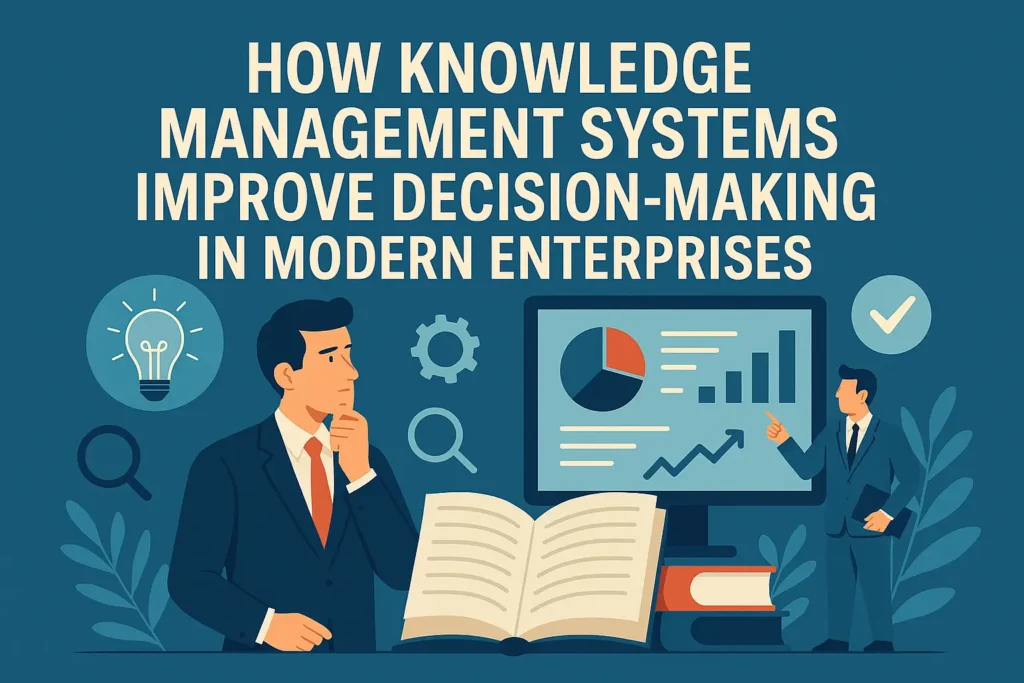In today’s complex business environment, organizations generate and consume knowledge at unprecedented speed. From internal documents and client records to industry research and real-time market intelligence, information flows continuously across the enterprise. Yet, the true challenge lies not in gathering data but in transforming it into actionable insights. This is where knowledge management systems (KMS) play a pivotal role. By capturing, organizing, and distributing knowledge effectively, these systems elevate decision-making processes, allowing enterprises to act with confidence and precision.

Why Decision-Making Needs Reinvention
Decision-making in enterprises has traditionally relied on a combination of intuition, past experience, and fragmented data sources. While these methods may have sufficed in slower markets, they are increasingly inadequate in today’s digital economy. Enterprises face challenges such as:
- Information overload, where decision-makers are flooded with unstructured data.
- Knowledge silos, which prevent cross-functional collaboration.
- Lack of real-time insights, leading to reactive rather than proactive decisions.
- Inconsistent access to institutional knowledge, especially in hybrid and global teams.
Enterprises that fail to modernize their approach to knowledge risk making slower, less-informed, and sometimes flawed decisions. Knowledge management systems address these issues by acting as the connective tissue between information, people, and business strategy.
The Role of Knowledge Management Systems in Decision-Making
A well-implemented KMS strengthens enterprise decision-making in several critical ways:
1. Centralizing Knowledge Assets
Instead of relying on scattered files, emails, or department-specific repositories, KMS provides a unified hub for storing and retrieving information. Decision-makers no longer waste valuable time searching for the latest policy update or client record—they can access trusted, verified content instantly.
2. Turning Data into Contextual Insights
Modern knowledge management systems integrate with analytics, AI, and semantic search technologies. This means data is not just stored, but contextualized. For example, a sales leader preparing to enter a new market can instantly access customer insights, competitive analysis, and historical case studies—organized in a way that directly supports their strategic choice.
3. Breaking Down Organizational Silos
KMS promotes collaboration across departments. When teams from operations, marketing, and finance share the same knowledge ecosystem, decisions are made with holistic perspectives. This cross-functional visibility reduces blind spots and ensures alignment with enterprise goals.
4. Ensuring Knowledge Accuracy and Trust
Decisions are only as strong as the information behind them. With features such as version control, verification workflows, and expert tagging, KMS ensures that decision-makers rely on validated and up-to-date knowledge. This eliminates costly errors that arise from outdated or conflicting information.
5. Enhancing Agility Through Real-Time Access
In modern enterprises, speed matters. Whether addressing a customer issue, responding to regulatory changes, or pivoting strategy, leaders need immediate access to the right knowledge. KMS enables real-time decision-making by delivering information in context, often embedded directly into workflows through integrations with collaboration platforms.
Real-World Examples of KMS-Driven Decision-Making
Several global enterprises have successfully leveraged knowledge management systems to transform their decision-making processes:
- Deloitte uses cognitive knowledge management to connect consultants with institutional insights, reducing decision latency in client engagements.
- Procter & Gamble leverages KMS to unify research, market data, and consumer insights, supporting faster product innovation decisions.
- IBM Watson Knowledge Catalog empowers enterprises to apply AI to their knowledge ecosystems, enabling predictive decision-making across industries.
These cases demonstrate that KMS is not just about efficiency—it is about driving strategic decisions that determine long-term competitiveness.
How Knowledge Management Systems Improve Different Types of Enterprise Decisions
- Strategic Decisions – Executives planning mergers, acquisitions, or market expansions rely on comprehensive knowledge ecosystems that combine external intelligence with internal expertise.
- Operational Decisions – KMS streamlines supply chain, HR, and customer service decisions by ensuring access to standard operating procedures, historical performance data, and real-time updates.
- Tactical Decisions – Middle managers use KMS to allocate resources, optimize campaigns, and adapt to short-term performance challenges with greater accuracy.
By aligning decisions across these layers, enterprises achieve consistency, resilience, and measurable outcomes.
Best Practices for Leveraging KMS in Decision-Making
To maximize the decision-making value of knowledge management systems, enterprises should:
- Design around decision workflows: Map how decisions are made across functions and integrate KMS directly into those processes.
- Adopt AI-powered search and insights: Semantic search and cognitive tools ensure that knowledge is delivered contextually.
- Foster a culture of contribution: Encourage employees to actively document lessons learned, insights, and expertise.
- Prioritize governance and trust: Establish clear protocols for knowledge validation, access control, and lifecycle management.
- Measure impact: Track decision speed, accuracy, and outcomes to prove the ROI of knowledge-enabled decision-making.
The Future: Decision Intelligence and KMS Convergence
Looking ahead, the integration of decision intelligence frameworks with KMS will define the next evolution of enterprise decision-making. Decision intelligence combines data science, AI, and KM principles to model complex business scenarios, simulate outcomes, and recommend optimal paths. When paired with KMS, enterprises will not only access knowledge but also understand the predictive implications of using it.
Final Thoughts
Enterprises that embrace knowledge management systems for decision-making gain a competitive advantage. They move beyond fragmented data and instinct-based choices toward informed, strategic, and agile decisions. As industries continue to evolve at speed, KMS will be indispensable in ensuring enterprises can adapt, compete, and thrive.
The question for modern leaders is no longer whether to invest in knowledge management systems, but how quickly they can embed them into decision-making processes to secure long-term success.
Read: Knowledge Management Systems in Business: A Guide to Driving Growth and Efficiency
